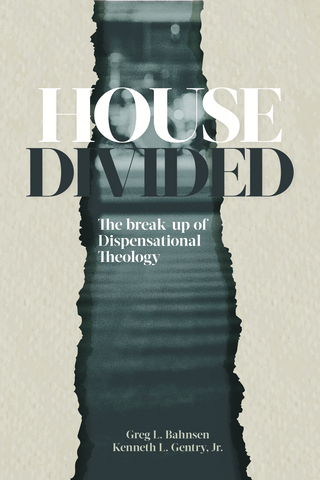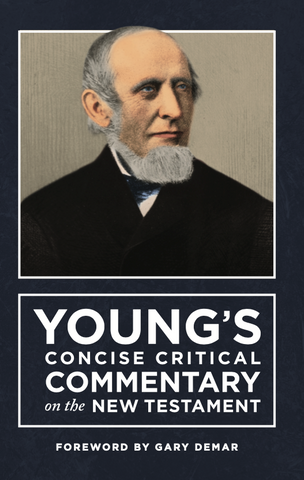In 2 Timothy 4:1, the Apostle Paul picks up the theme of judging the living and the dead: “I solemnly exhort you in the presence of God and of Christ Jesus, who is [about] to judge the living and the dead, and by His appearing and His kingdom.” The Greek has “about to judge” (μέλλοντος κρίνειν/mellontos krinein). This reads a lot like what is found in Matthew 16:27-28, Acts 17:31, and Psalm 96:13. Is this judgment a single act in our future, or was Paul describing what was about to happen? Kenneth Gentry writes the following in his section of the book House Divided, co-authored with Greg L. Bahnsen, in response to the 1988 book Dominion Theology: Blessing or Curse?:
One passage [H. Wayne House and Thomas Ice reference in their book Dominion Theology: Blessing or Curse?] they use is 2 Timothy 4:1…. There are three live possibilities beyond the dispensational interpretation (which has been shown to be inadequate on other grounds) as to how to approach this passage. First, it could be that Paul looks to the coming of the kingdom with power, which powerful, judgment-coming was to occur in that generation (cp. Mark 9:1 [parallel to Matt. 16:27-28]; Luke 21:31). Thus, it would refer to the destruction of the temple, when Christ manifested His judgment through fulfillment of His prophetic word (Matt. 24:1-34), bringing wrath upon the Jews (Matt. 23:29-24:2; 1 Thess. 2:16). That was future from Paul’s vantage point.[1]
Gentry does not dismiss the above interpretation, but he does not agree with it. He does mention that the Greek word mellō is present like it is in Matthew 16:27. He cites Matthew 16:28 as evidence of “the nearness of His kingdom.”[2] Note that 1 Timothy 4:1 mentions “by His appearing and His kingdom.” This seems to match the timing of Matthew 16:28.

House Divided: The Break Up of Dispensational Theology
The book that started a revolution. Bahnsen and Gentry stir the hornet's nest with this comprehensive refutation of Dispensationalism. The two pillars of law and eschatology are dealt with evenly, fairly—and most importantly—biblically. Bahnsen takes on the law sections, while Gentry handles the eschatology. Dispensationalism teaches that God has two distinct plans: one for Israel and one for the Church. Bahnsen and Gentry show clearly that God never intended or taught about separate plans. Quite the opposite, God's plan for Israel was but the first phase of His plan for the world. Jesus was both God's plan and His solution before the foundation of the world (1 Peter 1:17-21).
Buy NowLet’s add the following from William E. Biederwolf’s work The Second Coming Bible.
“I charge thee in the sight of God, and of Christ Jesus, who shall judge the living and the dead, and by his appearing and his kingdom” … There is an interesting turn in the expression. “shall judge”, which we have noticed nowhere else; it really means “about to judge”. There is no doubt but that grammatically this rendering is correct. The word “mellontos” does carry, according to all lexicons consulted, the idea of “to be about to do anything”, and this is all the more true when used with a present infinitive. Thus Thayer in his lexicon defines the word, with the infinitive present, “to be on the point of doing something”. It cannot therefore be thought over-refined or arbitrary to see in the expression, as used by Paul, an added evidence of his feeling that the coming again of his Lord was not to be conceived of as in the far distant future.[3]
Many other commentators take note of the use of mellō in 2 Timothy 4:1 and its translation as “about to.” For example, the Lutheran scholar Richard C.H. Lenski:
“I am earnestly testifying in the sight of God and of Jesus Christ, the one about to judge living and dead both by his epiphany and by his kingdom” … This is Paul’s last, most earnest, and solemn testimony to Timothy. He makes it “in the sight of God and of Christ Jesus”; this is an expression that he has used before. He now wants it to be stronger, as strong as he is able to make it; it is his last, it is to impress Timothy more deeply than ever. So Paul adds the apposition: “of the One about to judge living and dead.” Μέλλω with the present infinitive is a periphrastic future. In the sight of this Judge who will soon judge living and dead, whom Paul expects to meet after a martyr’s death that is near at hand, whom Timothy, too, must meet, Paul here lays his solemn testimony upon the heart of Timothy.[4]
To be honest, Lenski does not apply “this Judge who will soon judge living and dead” to anything that was near to the time Paul wrote the epistle except that Paul and Timothy expended “to meet a martyr’s death that is near at hand.” Does Lenski assume that Paul was mistaken about the nearness of that judgment coming?
Here’s an example from Kenneth Wuest, a noted dispensationalist:
The Lord Jesus Christ is described as One “who shall judge the quick and the dead.” “Shall” is mellō, “to be about” to do something. The word is used of someone who is on the point of doing something, and in Scripture, of those things which will come to pass by fixed necessity or divine appointment. Paul was living in the expectation of the imminent return of the Lord.[5]
There are additional examples of commentators who acknowledge that those in the pre-AD 70 church were led to believe that there was a near expectation of some eschatological transformation and transition as the writer of Hebrews pointed out: “When He said, ‘A new covenant,’ He has made the first obsolete. But whatever is becoming obsolete and growing old is near [ἐγγὺς/engus] to disappear” (8:13). Paul is reinforcing that fact to Timothy:
To describe Christ Jesus as one “who will [is about to] judge the living and the dead” is to draw on a traditional configuration by which the early church conceived of the risen Christ’s role… the “judgment” Christ executes upon his return is received both by those who are alive at that moment and those who have already died (cf. 1 Thess 4:13-16). A sense of urgency, imminence and certainty is added to this picture by the characteristic futuristic “about to” that occurs elsewhere in similar discussions of the coming Eschaton.[6]
Paul most likely had “those who have already died” on his mind when he said that he was on trial “for the resurrection of the dead” (Acts 24:21), that is, those OT saints who had died.
Robert Young, translates 2 Timothy 4:1 in his Concise Critical Comments as “CHARGE,] lit. ‘testify thoroughly…who is about to judge living and dead, according to his full-manifestation, and his reign.’”

Young's Concise Critical Commentary on the NT
In addition to his Analytical Concordance to the Bible—where the original Hebrew or Greek words are listed as well as the pronunciation—Robert Young (1822-1888) also published several editions of his Literal Translation of the Bible (YLT). He also published the Concise Critical Bible Commentary that was "Specially Designed for Those Teaching the Word of God."
Buy NowYou will often find the Greek word mellō untranslated because in many contexts it means that an event is to take place. Some commentators argue that mellō often only means certainty. If certainty or inevitability is what needs to be communicated, then why not use the common Greek verb δεῖ/dei? William Mounce defines δεῖ as “it is binding, it is necessary, it is proper; it is inevitable.” Mello is a significant time indicator that stumps many commentators and translators because it messes with their eschatological paradigm.
Similar language is found in Psalm 96:13:
Let the field exult, and all that is in it.
Then all the trees of the forest will sing for joy
Before the LORD, for He is coming,
For He is coming to judge the earth [γῆν : land].
He will judge the world [LXX: οἰκουμένην] in righteousness
And the peoples in His faithfulness.
Did the world at that time reject the belief that God was coming in their day to judge their world in righteousness? God certainly judged Israel and Judah. He judged the Babylonians, Medes and Persians, Greece, and Rome. Spurgeon comments in his Treasury of David:
Verse 13.— “For he cometh, for he cometh.” Because the thing was hard to be believed, the Prophet asserts twice that God should come, that he should be Judge and King, and Governor of all.—Martinus Bucerus in Expos. Ecclesiast.
Verse 13.— “He cometh.” Not יבוא, “He shall come;” but בּא לשׁפּט, “He cometh;” to show how near the time is. It is almost day-break, and the court is ready to sit: “The Judge standeth at the door,” James 5:9.—Thomas Watson.
We’ve lost the notion of God judging in the here and now. Israel and Judah learned the lesson the hard way. So did Nebuchadnezzar (Dan. 4:28-32) and Belshazzar (5:30-31). Psalm 96**[7]** served as an encouragement from God as He brings both negative and positive sanctions. The New Covenant expressed that reality. As judgment came on that generation and brought an end to the Old Covenant, a new day dawned and would continue to do so. William S. Plumer makes the following observation on Psalm 96:13 in his massive commentary on the Psalms originally published in 1867:
Before the Lord: for he cometh, for he cometh to judge the earth: he shall judge the world with righteousness, and the people with his truth. The terms of this verse have their usual signification. Although the final judgment of the world shall bring unspeakable joy to all right-minded people, and although the administration of Christ over the world would not be complete without the decisions and revelations of the last day; yet the primary reference of this passage is not to a “retributive, but a gracious judging,” when the law of love shall universally prevail, when men shall copy the divine equity, candor, and fidelity; when the arts of peace shall entirely supersede those of destruction, and men shall do to others as they would have others do to them. Patrick: “Let them welcome that day; and meet the Lord with forward affection, who is coming to them: For he comes to reform the earth, and will govern mankind by righteous and merciful laws; and faithfully keep his word with all those that truly observe them.”
[1] House Divided: The Break-Up of Dispensational Theology, 187-188. Originally published in 1988 by Institute for Christian Economics and reprinted in 2022 by American Vision.
[2] House Divided, 180.
[3] William Edward Biederwolf, The Millennium Bible (Grand Rapids, MI: Baker Book House, [1924] 1964), 501, 502-503.
[4] Lenski, The Interpretation of St, Paul’s Epistles to the Colossians, to the Thessalonians, to Timothy, to Titus and to Philemon (Minneapolis, MN: Augsburg Publishing House, [1937] 1964), 849, 850-851.
[5] Kenneth S. Wuest, Wuest’s Word Studies: The Pastoral Epistles in the Greek New Testament for the English Readers (Grand Rapids, MI: Eerdmans, 1952), 153.
[6] Philip H. Towner, Timothy and Titus, NICNT (Grand Rapids, MI: Eerdmans, 2006), 596
[7] “Is it Messianic? On this subject there is hardly any doubt. The Syriac calls it ‘a prophecy concerning the advent of Christ and the calling of the Gentiles who should believe in him.’ Luther: ‘This is a prophecy concerning the kingdom of Christ, and the spreading of the gospel over the whole world and before every creature; which gospel will be a word of joy and thanksgiving, of peace, of rejoicing, and of a continued sacrifice of praise.’ To the same effect we might cite Calvin, Venema, Gill, Morison, Home, Scott, Fry and Tholuck. The only name of God here found is Jehovah Lord, on which see on Psalm i. 2. This Psalm in several respects resembles Ps. xcv., but widely differs from it in others.” —Plumer, Psalms, 877-878.

